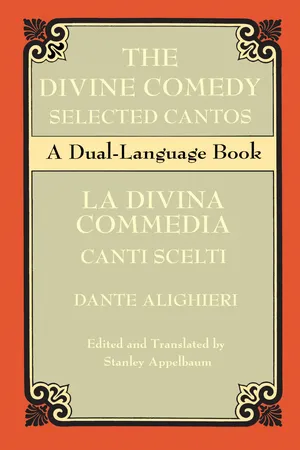![]()
PURGATORIO
Canto I
Per correr migliori acque alza le vele
ornai la navicella del mio ingegno,
che lascia dietro a sè mar sì crudele;
e canterò di quel secondo regno
dove l’umano spirito si purga
e di salire al ciel diventa degno.
Ma qui la morta poesì resurga,
o sante Muse, poi che vostro sono;
e qui Calliopè alquanto surga,
seguitando il mio canto con quel sòno
di cui le Piche misere sentiro
lo colpo tal, che disperar perdono.
Dolce color d’orïental zaffiro,
che s’accoglieva nel sereno aspetto
del mezzo, puro insino al primo giro,
alli occhi miei ricominciò diletto,
tosto ch’io usci’ fuor dell’aura morta
che m’avea contristati li occhi e ’l petto.
Lo bel pianeta che d’amar conforta
faceva tutto rider l’orïente,
velando i Pesci, ch’erano in sua scorta.
I’ mi volsi a man destra, e puosi mente
all’altro polo, e vidi quattro stelle
PURGATORY
Canto I
To travel better waters, the little boat
of my intellect now hoists its sails,
leaving behind a sea so cruel;
and I shall sing about that second realm,
where the human spirit is purged
and becomes worthy of ascending to heaven.
But here let my poetry, which dealt with death, return to life,
O sacred Muses, since I belong to you,
and here let Calliope1 rise somewhat higher,
accompanying my song with that music
the force of which the unhappy magpies
felt so strongly that they despaired of pardon.2
The gentle color of oriental sapphire,
which was gathering on the serene face
of the atmosphere all the way to the horizon,
brought delight back to my eyes
the moment that I emerged from the dead air
that had saddened my eyes and my breast.
The beautiful planet that encourages us to love3
was making all the east smile,
dimming the Fishes, which were escorting it.4
I turned to the right, and set my mind
on that other pole,5 and I saw four stars6
non viste mai fuor ch’alla prima gente.
Goder pareva il ciel di lor fiammelle:
oh settentrïonal vedovo sito,
poi che privato se’ di mirar quelle!
Com’io da loro sguardo fui partito,
un poco me volgendo all’altro polo,
là onde il Carro già era sparito,
vidi presso di me un veglio solo,
degno di tanta reverenza in vista,
che più non dee a padre alcun figliuolo.
Lunga la barba e di pel bianco mista
portava, a’ suoi capelli simigliante,
de’ quai cadeva al petto doppia lista.
Li raggi delle quattro luci sante
fregiavan sì la sua faccia di lume,
ch’i’ ’l vedea come ’l sol fosse davante.
«Chi siete voi che contro al cieco fiume
fuggita avete la pregione etterna?»
diss’el, movendo quelle oneste piume.
«Chi v’ha guidati, o che vi fu lucerna,
uscendo fuor della profonda notte
che sempre nera fa la valle inferna?
Son le leggi d’abisso così rotte?
o è mutato in ciel novo consiglio,
che, dannati, venite alle mie grotte?»
Lo duca mio allor mi diè di piglio,
e con parole e con mani e con cenni
reverenti mi fè le gambe e ’l ciglio.
Poscia rispuose lui: «Da me non venni:
donna scese dal ciel, per li cui prieghi
della mia compagnia costui sovvenni.
Ma da ch’è tuo voler che più si spieghi
di nostra condizion com’ell’è vera,
esser non puote il mio che a te si nieghi.
Questi non vide mai l’ultima sera;
ma per la sua follia le fu sì presso,
che molto poco tempo a volger era.
never before seen except by the first people.7
The sky seemed to rejoice in their little flames:
oh, northern hemisphere, how bereft you are,
since you are denied the sight of them!
When I had finished looking at them,
turning a little toward the other pole,8
where the Big Dipper had already disappeared,
I saw near me an old man standing alone,
of an appearance deserving of such reverence
that no son owes more to his father.
He bore a long beard that was partly white,
similar to his hair,
the two strands of which fell onto his ches...
